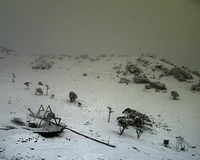 |
Paris (AFP) Dec 21, 2010 Counter-intuitive but true, say scientists: a string of freezing European winters scattered over the last decade has been driven in large part by global warming. The culprit, according to a new study, is the Arctic's receding surface ice, which at current rates of decline could to disappear entirely during summer months by century's end. The mechanism uncovered triples the chances that future winters in Europe and north Asia will be similarly inclement, the study reports. Bitingly cold weather wreaked havoc across Europe in the winter months of 2005-2006, dumping snow in southern Spain and plunging eastern Europe and Russia into an unusually -- and deadly -- deep freeze. Another sustained cold streak in 2009-2010, gave Britain its coldest winter in 14 years, and wreaked transportation havoc across the continent. This year seems poised to deliver a repeat performance. At first glance, this flurry of frostiness would seem to be at odds with standard climate change scenarios in which Earth's temperature steadily rises, possibly by as much as five or six degrees Celsius (9.0 to 10.8 degrees Fahrenheit) by 2100. Climate sceptics who question the gravity of global warming or that humans are to blame point to the deep chills as confirmation of their doubts. Such assertions, counter scientists, mistakenly conflate the long-term patterns of climate with the short-term vagaries of weather, and ignore regional variation in climate change impacts. New research, however, goes further, showing that global warming has actually contributed to Europe's winter blues. Rising temperatures in the Arctic -- increasing at two to three times the global average -- have peeled back the region's floating ice cover by 20 percent over the last three decades. This has allowed more of the Sun's radiative force to be absorbed by dark-blue sea rather than bounced back into space by reflective ice and snow, accelerating the warming process. More critically for weather patterns, it has also created a massive source of heat during the winter months. "Say the ocean is at zero degrees Celsius (32 degrees Fahrenheit)," said Stefan Rahmstorf, a climate scientist at the Potsdam Institute for Climate Impact Research in Germany. "That is a lot warmer than the overlying air in the polar area in winter, so you get a major heat flow heating up the atmosphere from below which you don't have when it is covered by ice. That's a massive change," he told AFP in an interview. The result, according to a modelling study published earlier this month the Journal of Geophysical Research, is a strong high-pressure system over the newly-exposed sea which brings cold polar air, swirling counter-clockwise, into Europe. "Recent severe winters like last year's or the one of 2005-2006 do not conflict with the global warming picture, but rather supplement it," explained Vladimir Petoukhov, lead author of the study and a physicist at the Potsdam Institute. "These anomalies could triple the probability of cold winter extremes in Europe and north Asia," he said. The researchers created a computer model simulating the impact on weather patterns of a gradual reduction of winter ice cover in the Barents-Kara Sea, north of Scandinavia. Other possible explanations for uncommonly cold winters -- reduced Sun activity or changes in the Gulf Stream -- "tend to exaggerate their effect," Petoukhov said. He also points out that during the freezing 2005-2006 winter, when temperatures averaged 10 C below normal in Siberia, there were no unusual variations in the north Atlantic oscillation, another putative cause. Colder European winters do not indicate a slowing of global warming trends, only an uneven distribution, researchers say. "As I look out my window is see about 30 centimetres of snow and the thermostat reads -14.0 C," said Rahmstorf, speaking by phone from Potsdam. "At the same time, in Greenland we have above zero temperatures -- in December."
Share This Article With Planet Earth
Related Links It's A White Out at TerraDaily.com
 Australia swaps summer for Christmas snow at Charlotte Pass
Australia swaps summer for Christmas snow at Charlotte PassSydney (AFP) Dec 20, 2010 Snow fell in Australia on Monday, as the usual hot and summery December weather was replaced in parts by icy gusts sweeping up from the Southern Ocean, giving the country a taste of a white Christmas. Snow has fallen in parts of east coast states New South Wales and Victoria, leaving ski resorts - some of which are usually snow-free at this time of year - with dumps of up to 10 centimetres ... read more |
|
| The content herein, unless otherwise known to be public domain, are Copyright 1995-2010 - SpaceDaily. AFP and UPI Wire Stories are copyright Agence France-Presse and United Press International. ESA Portal Reports are copyright European Space Agency. All NASA sourced material is public domain. Additional copyrights may apply in whole or part to other bona fide parties. Advertising does not imply endorsement,agreement or approval of any opinions, statements or information provided by SpaceDaily on any Web page published or hosted by SpaceDaily. Privacy Statement |